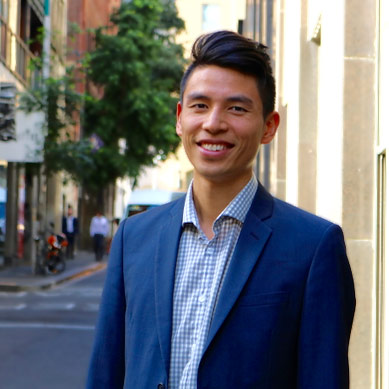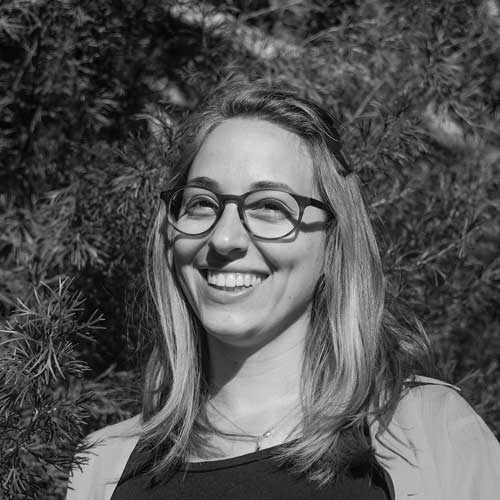Communicating Climate Change
Timothy Shue started the ICLEI Young Writers Network when he noticed a gap between the passion and education of young researchers, and their confidence to effectively communicate their research to the wider community. In this insightful Q+A, Tim and fellow Science Alum Amélie Uhrig discuss the power of effective science communication in climate change discourse.
About Timothy Shue 
I finished my master’s degree doing an internship with a local government in northern Denmark, in a city called Aalborg. I worked a short contract there before coming back to Melbourne, then started part-time work with ICLEI while also working as a librarian at the City of Port Phillip library service.
About Amélie Uhrig
After finishing my Master in Environmental Sciences, I first worked seasonally in the arts space before landing a full-time position as consultant at Point Advisory, a small Melbourne-based sustainability consultancy. I am part of the Climate Change and Environment team working on projects, for instance, around carbon markets and carbon forestry.
What is the ICLEI Young Writers Network, and what does it do?
The ICLEI Young Writers Network is a programme aimed at sustainability students to help them communicate their research to broader audiences. Since its inception, we’ve consulted for students and teachers, run workshops and organised discussion groups on issues to do with climate communication such as climate language and framing climate issues.
Why are you involved in the Young Writers Network?
AU: I have previously worked in international cooperation where we supported schools and local government to increase climate literacy amongst the younger generation. I really enjoyed that work – translating complex technical issues such as climate change to a non-technical audience, and so when I heard about the Young Writers Network I thought I might be able to support the program with this kind of experience. How about you, Tim?
TS: I think I was dissatisfied with this idea that students did not feel like they could take their research into the real world. I started the Network because it was really about giving confidence to a cohort of well-educated and passionate people, by combining that with my background in science communications.
AU: You know what I realised the other day, when I was thinking about what I am passionate about, which is talking with people about climate change, that I never put these dots together until I started volunteering for the Young Writers Network - that this is actually science communications.
TS: For sure, and it’s kind of this thing we do but we never think too critically about it. And I think it’s important to draw attention to the fact we need to be paying critical awareness to the way we communicate these issues. There are a lot of risks with communicating climate poorly that we may not be aware of. There are barriers such as resistance to understanding issues around climate change, so I think it’s particularly important to support a cohort of people, especially younger generations, who can then feel confident and equipped to be able to communicate on these complex issues effectively in the professional arena as well as in civil society.
AU: And I do think it becomes more important generally to be more thoughtful about how we communicate climate change. That’s what I see in my professional work too.
What is the most important lesson you’ve learned about communicating climate change?
AU: I think for me the most important lesson is that we need to make climate change relatable in order for people to engage with the topic. I really like the metaphors and storytelling aspects of communicating climate change, which I also use in other parts of my professional and private life.
TS: Do you think that’s the most important lesson to you because climate change in general is so difficult to relate to?
AU: Yes, I think so. It’s so intangible, and is such a wicked problem that is really hard to bring down to an individual level.
TS: I agree, and I think it’s also about making people feel like they belong and that they can contribute something positive.
I think we've been quite irresponsible with the way a lot of climate change messaging is developed in public narratives, the media and policy because any time that there are elements of anger or frustration, it removes space for understanding, listening, dialogue, compromise and empathy.
The main question is how do we facilitate quality conversations with people across the political spectrum, who may disagree on so many things? That’s where you make real progress – when you’re communicating effectively about climate change issues.
AU: And that it does not matter whether you agree on specifics. It’s more about having those conversations in the first place. Getting clarity on what matters most to you and to other people and being aware of other peoples’ opinions as well.
TS: Agreed.
What do you think is the biggest challenge with communicating climate change?
AU: I think it comes down to balancing engaging with people without making them feel overwhelmed.
TS: So, I guess what you’re saying is that brings a risk, and that risk is that by communicating climate change in certain ways there are ways of disengaging people, is that right?
AU: Yes. I think my concern is that you often talk about climate change within your own bubble and because you are exposed to it all the time that you have developed mechanisms to cope with the impacts of climate change mentally. However, not everyone has these mechanisms at hand and can be easily overwhelmed by it. How about you?
TS: Maybe the biggest challenge of communicating climate change is that there’s an illusion of progress. A lot of the time we talk with people who share similar beliefs—as you said earlier, we’re often in a bubble.
I think there’s also a risk of not always understanding what we’re aiming for when we communicate about climate change, often we do it because it’s part of our job or because that’s what we’re interested in and we want to talk with others who are also interested. But those really challenging conversations and the conversations we don’t really want to have? They’re the ones that we need to have.
Thanks to alumni and Science communicators like Tim and Amélie, the Young Writers Network exists. Tim's vision of arming people with skills and information to go out and have conversations in an inclusive, non-judgmental way that doesn’t leave people feeling ashamed or guilty for their values or worldviews is ambitious, but this ambition is important and necessary for making a difference and tackling climate change.
In Tim's words:
If we don’t think about how we actually convene those discussions in ways that progresses understanding, I think we’re at risk of being under the illusion of progress.
Connect with Tim and Amélie, and join the Science Alumni Group on LinkedIn.